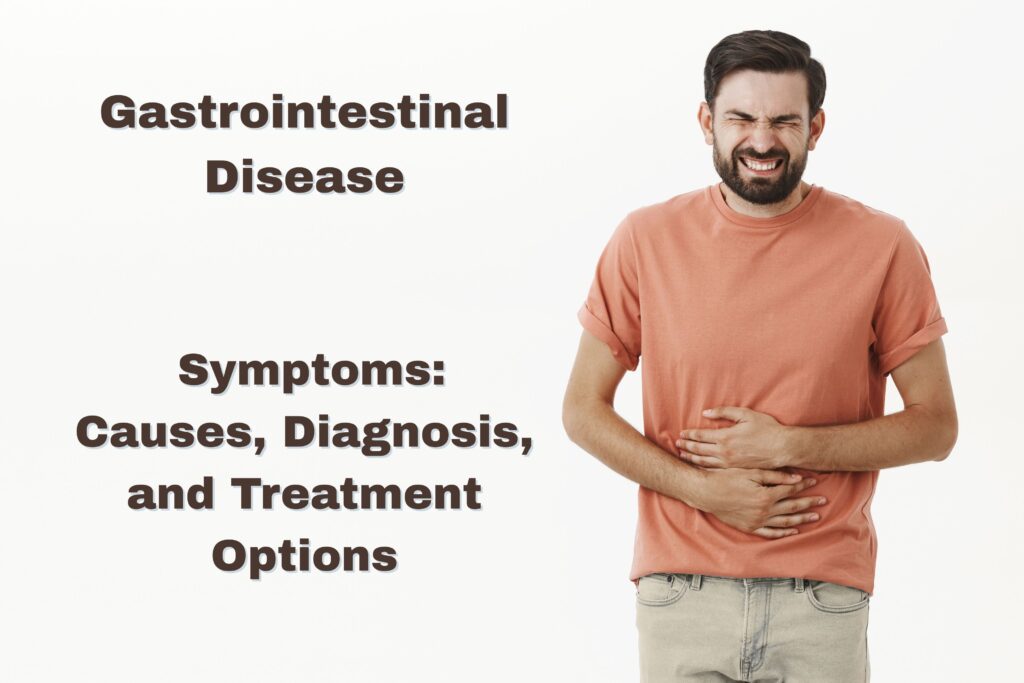
Millions of people worldwide suffer from gastrointestinal (GI) disorders, which affect both digestion and general health. From minor discomfort to serious pain and complications, symptoms can vary widely. In this blog, we’ll explore the common gastrointestinal disease symptoms, their causes, and available treatment options to help manage these conditions effectively.
Key Takeaways
- Gastrointestinal Disease Symptoms: These can include abdominal pain, bloating, diarrhea, constipation, nausea, and more, which vary depending on the underlying condition.
- Common Causes: Causes of gastrointestinal issues may range from infections, poor diet, chronic conditions like IBS, to lifestyle factors like stress.
- Early Diagnosis: Identifying symptoms early can help in effective diagnosis and treatment to avoid complications.
- Treatment Options: Treatment depends on the specific GI disorder and may include lifestyle changes, medications, or surgery in severe cases.
Table of Contents
1. Introduction to Gastrointestinal Diseases
Gastrointestinal diseases encompass a wide range of conditions affecting the stomach, intestines, liver, and other digestive organs. These diseases can be acute or chronic and affect the body’s ability to digest food, absorb nutrients, and eliminate waste effectively.
2. Common Gastrointestinal Disease Symptoms
The symptoms of gastrointestinal diseases can vary significantly. Among the most typical signs of gastrointestinal disorders are:
- Abdominal pain: A frequent and often severe symptom, which may occur after meals or at random times throughout the day.
- Bloating: A feeling of fullness and tightness in the stomach, often accompanied by discomfort.
- Vomiting and nausea: These symptoms can accompany more serious illnesses like infections or digestive tract blockages.
- Diarrhea or constipation: Uncontrolled bowel movements or infrequent, hard stools.
- Heartburn or acid reflux: Acid reflux and heartburn are typical symptoms of gastrointestinal problems, particularly gastro-oesophageal reflux disease (GERD).
3. Common Causes of Gastrointestinal Disorders
Understanding the causes of gastrointestinal issues can aid in the prevention and treatment of digestive problems. Some common causes include:
- Infections: Bacterial, viral, or parasitic infections can cause temporary gastrointestinal distress.
- Poor diet: Diets high in fats, sugars, and processed foods can lead to GI problems like acid reflux and indigestion.
- Stress and lifestyle: Stress and poor lifestyle habits are often linked to conditions like irritable bowel syndrome (IBS).
- Chronic conditions: Diseases like Crohn’s disease, ulcerative colitis, and celiac disease are long-term disorders that affect the GI tract.
- Medications: Some medications can irritate the stomach or lead to digestive issues.
4. How Gastrointestinal Diseases Are Diagnosed
Diagnosing gastrointestinal diseases typically involves a combination of medical history, physical exams, and diagnostic tests such as:
- Blood tests
- Stool tests
- Endoscopy or colonoscopy
- Imaging tests like CT scans and X-rays
Early diagnosis is essential to manage gastrointestinal diseases effectively.
5. Treatment and Management of Gastrointestinal Disorders
Treatment for gastrointestinal disorders depends on the underlying cause of the symptoms. Common approaches include:
- Dietary changes: Eating a balanced diet rich in fiber and avoiding trigger foods can help alleviate symptoms.
- Medications: Antacids, anti-inflammatory drugs, antibiotics, or immunosuppressive medications may be prescribed depending on the condition.
- Lifestyle modifications: Reducing stress, getting regular exercise, and staying hydrated can help manage many digestive disorders.
- Surgery: In severe cases, surgical intervention may be necessary, especially for conditions like Crohn’s disease or colon cancer.
Final Thoughts
Gastrointestinal diseases can significantly impact your daily life. By recognizing the symptoms early and understanding their causes, you can take the necessary steps to improve your digestive health. If you are experiencing persistent gastrointestinal issues, consult a healthcare professional to receive a proper diagnosis and treatment plan.
Get Expert Help for Digestive Health
At Pentagon Hospital, our General Medicine department provides expert diagnosis and personalized treatment plans for a wide range of gastrointestinal issues. Whether you’re dealing with chronic discomfort or sudden digestive symptoms, our team of experienced physicians is here to help you regain your health and comfort.
FAQs
What are the main symptoms of gastrointestinal diseases?
Common symptoms include abdominal pain, bloating, nausea, vomiting, diarrhea, constipation, and heartburn.
What causes gastrointestinal issues?
GI issues can be caused by infections, poor diet, chronic conditions like IBS, stress, or medications.
How are gastrointestinal diseases diagnosed?
Diagnosis typically involves physical exams, blood tests, stool tests, imaging, and endoscopy.
What are the treatment options for gastrointestinal disorders?
Treatment options include dietary changes, medications, lifestyle modifications, and, in severe cases, surgery.
Can stress cause gastrointestinal problems?
Indeed, stress plays a big role in diseases like acid reflux and IBS, and stress management can help with digestive health.
We look forward to assisting you with your healthcare needs.
Just Make an Appointment
and You’re Done!


